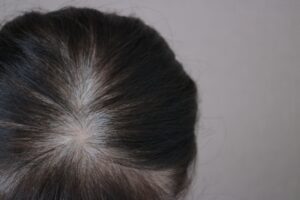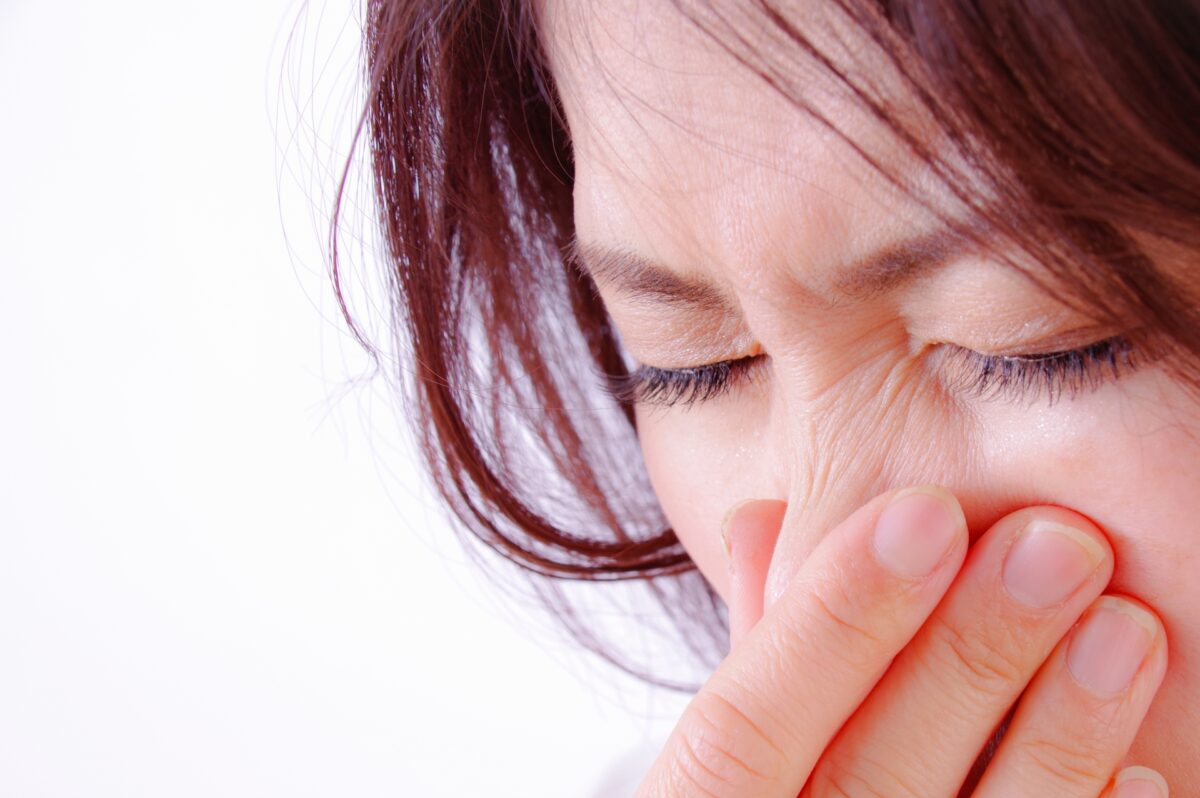Are you in trouble with body odor during menopause? Causes and what you can do
Body odor during menopause varies by different causes. Hormonal change is one of them. On the other hand, the general aging odor, which usually evokes us middle-aged men, happens to women, too. Middle-aged and fatigue odors sound similar to aging odor, but we distinguish them due to their different causes.
What kind of smell is aging odor?
 Aging odor refers to body odor that becomes stronger at about age 50, regardless of whether it is a man or a woman.
Aging odor refers to body odor that becomes stronger at about age 50, regardless of whether it is a man or a woman.
Middle-aged oily odor is often confused with aging odor. It smells like fermented foods such as yogurt and cheese or old oil. It is often mixed with aging odor and exacerbates it in people’s 40s and 50s.
In your 20s, the smell of sweat from your armpits is the major part of the body’s smell. It weakens a little in your late 40s and early 50s. At the same time, the middle-aged oily odor becomes stronger, and then the aging odor gradually becomes stronger.
Places where aging odor and middle-aged oily odor occur
 Middle-aged oily odor tends to occur after sweating. It is often stronger in the back of the neck and the back of the ears, where you have sticky and oily sweat. Thus it tends to transfer to your pillow.
Middle-aged oily odor tends to occur after sweating. It is often stronger in the back of the neck and the back of the ears, where you have sticky and oily sweat. Thus it tends to transfer to your pillow.
On the other hand, aging odor mainly arises in the chest and back, where sebum secretion is active. It often remains in the clothes of the person from whom the smell originated or even in the place where he/she was.
It is not only men! Women also have aging odor
Aging odor was used to describe the smell of middle-aged and older men. However, we know that aging odor occurs in women as they age. It shapes a part of body odor during menopause.
Female hormones usually suppress the excessive secretion of sebum. But the secretion of female hormones decreases during menopause. As a result, it promotes sebum secretion, and 2-nonenal, a skin gas that causes aging odor, is released more and more as we age.
In addition, sweat that flows in hot flashes and hyperhidrosis, two typical menopause symptoms, contain lactic acid, and it is better to pay attention to middle-aged oily odor.
Even for women, after middle-aged and older age, the components that generate unpleasant odors increase, making them smell aging odors. At the same time, the materials that give off pleasant body odors decrease.
For women, “lactone”, a component of fragrance that makes you feel the sweetness peculiar to women, is diffused. However, research results show that after age 35, the released lactone decreases sharply. It emphasizes the body odor during menopause.
What causes body odor during menopause?
Skin gases cause body odors when released at the oxidation and decomposition of secreted sebum and sweat components. Aging odor and middle-aged oily odor are classified as different odors because the elements of skin gases differ.
Cause of aging odor
Shiseido, the most prominent Japanese cosmetics brand, researched body odor and discovered that “2-nonenal” is the main component of body odor in middle-aged and elderly people. They named it “aging odor.” Sebum distribution decreases with age, but the amount of palmitoleic acid and lipid peroxide in the sebum, the raw material for 2-nonenal, increases, so the odor increases with age.
Causes of middle-aged oily odor
On the other hand, “middle-aged oily odor” is a smell named by Mandom. They are one of the famous Japanese cosmetics brands for men. They discovered a component of skin gas called “diacetyl.” “Diacetyl” is generated when bacteria indigenous to the skin decompose sweat containing lactic acid. Middle-aged oily odor tends to be especially strong on the back of the head and the neck we sweat much.
Beware of stress and fatigue odors!
Intense stress can make aging odors stronger. When stressed, it generates active oxygen, oxidizes sebum, and strengthens body odor.
Body odor may also include fatigue odor. When ammonia in the blood increases due to physical fatigue and psychological stress, it produces a pungent smell.
Is there a hidden illness behind body odor during menopause?
Diseases such as constipation, diabetes, gastrointestinal disorders, seborrheic dermatitis, and decreased kidney function can cause odor. If you suddenly feel a strong odor, you may have a hidden disease and need to consult a doctor. (This is not limited to menopausal women.)
How to deal with body odor during menopause? Five odor cares
How to deal with aging odor?
You can mitigate aging odors by taking appropriate measures.
Wipe off sweat
Routine care for sebum and sweat is the key to suppressing the generation of 2-nonenal and diacetyl. Do not let sweat remain on your skin; wipe it off with a handkerchief or sweat-wiping sheet.
Sweat itself has no odor. If you leave sweat unattended, the bacteria on the skin’s surface grow with it and generate the odor. Keeping your skin clean, such as wiping it off when you sweat and changing your clothes frequently, can reduce odors.
Soak in a bathtub
Spending long hours in an air-conditioned environment, many people lose the opportunity to sweat to regulate their body temperature. When the chances of sweating decrease, the function of the sweat glands deteriorates. It decreases the secretion of waste products in the body through sweat, and body odor tends to become stronger.
You can stimulate sweat gland function by soaking in a bathtub and warming the body. (The Japanese-style bathtub is not readily available elsewhere, and we recommend long showering or footbath as alternatives. (Here are some explanations of how.)
Wash one’s body carefully
You can clean away sebum and sweat by washing the body’s surface. Thoroughly wash areas that produce a lot of sebum, such as behind the ears, back of the neck, chest, and back, with soap. In particular, they say the scalp has more sebum than the T-zone of the face. Make sure to lather the shampoo well and not leave the shampoo residue on the scalp and hair.
However, scrubbing too much will increase the secretion of sebum indeed. Wash gently and carefully.
Use medicated soap
It is effective to use medicated soap containing ingredients that suppress the activity of bacteria that cause aging odor. By using medicated soap, you can create an environment where various bacteria can’t multiply actively even after sweating; thus, aging odor is less likely to occur.
For medicated soaps, we especially recommend polyphenols, which can expect to have high antibacterial and deodorizing effects. In addition, “Persimmon Tanitan,” “Tea catechin,” and “Bamboo vinegar liquid” are the ones with a good reputation in Japan.
Use antiperspirant
Using antiperspirants and deodorant sprays is an effective way to suppress aging and middle-aged oily odor. Antiperspirants come in cream, roll, and spray types. Cream and roll types that can be applied directly to the skin are the most effective deodorizing. In addition, the spray type is preferable because you can spray it on hard-to-reach places such as the back.
In addition, you can choose the feeling of use according to your preference. For example, you can pick those with powder that makes your skin smoother or those that give you refreshed feeling when you use it.
Lifestyle habits that prevent body odor during menopause
How to prevent aging
While sweat and body care are crucial to restrain aging odor, it is also essential to take measures from within. Keeping a healthy lifestyle will also help prevent aging. So what should we be careful about?
Don’t smoke
When you smoke, your blood vessels constrict, making it difficult for your blood to circulate. When the blood flow is blocked, it hinders the discharge of waste products and strengthens the odor of sebum.
In addition, the nicotine in cigarette smoke moves from the lungs to the blood when it enters the body and is dispersed through the skin. The smell of tobacco adds to the already challenging mixture of aging odor and middle-aged oily odor. For the sake of body odor and health, we recommend refraining from smoking.
Take a diet that suppresses aging odor, middle-aged oily odor, and fatigue odor
Daily meals are also essential in preventing the deterioration of body odor during and off menopause.
A diet that does not lean towards meat and fish
A well-balanced diet is vital to prevent aging. A diet that is biased towards meat and fish will increase the secretion of sebum. In addition to animal proteins such as meat and fish, it is necessary to devise ways to incorporate vegetable proteins such as soy products that suppress the generation of active oxygen. Of course, plenty of vegetables and the right amount of carbs are also essential. Eat a well-balanced diet to avoid malnutrition.
Foods with antioxidant properties
2-nonenal, which causes aging odor, is also generated by increased active enzymes, so actively take foods with antioxidant properties. Citrus fruits contain a lot of vitamin C, nuts contain vitamin E, green and yellow vegetables such as pumpkin and carrots contain a lot of β-carotene and carotenoids, and blueberries, wine, and bananas contain polyphenols. These foods have rich antioxidant properties.
Ingredients that regulate the intestinal environment
Adjusting the intestinal environment leads to the prevention of fatigue odor. It is crucial to increase the number of good bacteria in the intestine and reduce the number of harmful bacteria for a better intestinal environment. Harmful bacteria break down undigested proteins and amino acids that reach the large intestine, producing ammonia and other substances that cause bad odors.
Foods containing rich dietary fiber, such sea weed, mushroom and oligosaccharides, help increase good bacteria intestine. It will restrain the generation of ammonia, the cause of the bad odor, and help discharge other odorous substances with the stool. That is, it suppresses the aging odor.
Summary
In this article, we have introduced the causes, treatments, and prevention of aging odor. Age-related odor occurs at a certain age, regardless of gender, while menopause is also one of the causes of aging odor. However, you can suppress aging odor by taking appropriate measures. Prevention and countermeasures against aging odors require an external and internal approach.
By reviewing daily life, such as eating habits and body odor care, let’s live a healthy life without worrying about aging odors.
Take a soy food as a natural supplement
Juveriente®’s Effisoy, launched in 2016, based on fermented soy bean germ extract has been loved as a natural menopause relief since its launching in 2016. While it has gained reputation as a menopause supplement, it also has high anti-oxidant power coming from fermented soy. Isoflavone aglycone contained in Effisoy® has about 1,000 times of anti-oxidant potency than standard isoflavones.
Besides is, its primary function is to boost the weakened synthesis of a hormone precursor, DHEA. It’s safe as it only heals the natural synthesis function. The hormone boost doesn’t provide the only relief from menopausal symptoms. But, it also supports various aging issues and increases metabolism, which leads to weight loss. It is not limited only for menopause women, but also after menopause or older.
Here are some of the real product reviews in our Amazon shop.
“Restful sleep finally!!”, “I Am Now Free of Hot Flashes!!”, “Lifesaver”





